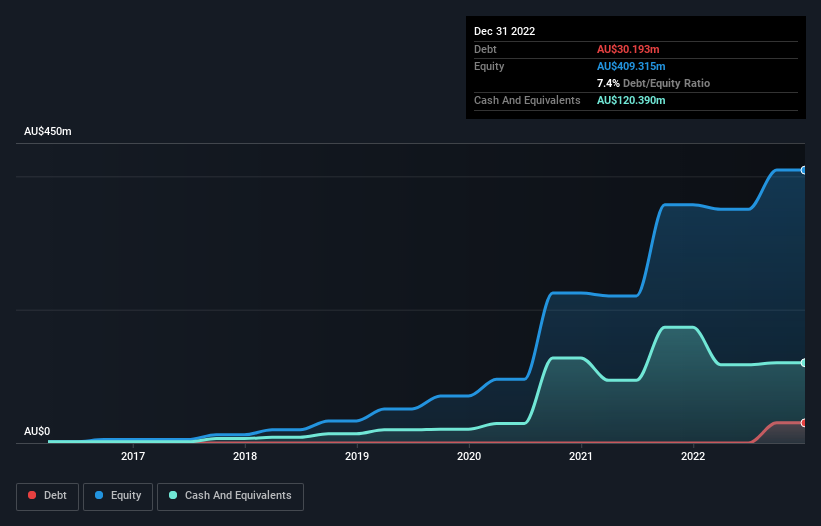David Iben put it well when he said, 'Volatility is not a risk we care about. What we care about is avoiding the permanent loss of capital.' So it seems the smart money knows that debt - which is usually involved in bankruptcies - is a very important factor, when you assess how risky a company is. As with many other companies Bellevue Gold Limited (ASX:BGL) makes use of debt. But is this debt a concern to shareholders?
When Is Debt A Problem?
Generally speaking, debt only becomes a real problem when a company can't easily pay it off, either by raising capital or with its own cash flow. In the worst case scenario, a company can go bankrupt if it cannot pay its creditors. However, a more usual (but still expensive) situation is where a company must dilute shareholders at a cheap share price simply to get debt under control. Of course, the upside of debt is that it often represents cheap capital, especially when it replaces dilution in a company with the ability to reinvest at high rates of return. The first thing to do when considering how much debt a business uses is to look at its cash and debt together.
See our latest analysis for Bellevue Gold
What Is Bellevue Gold's Debt?
As you can see below, at the end of December 2022, Bellevue Gold had AU$30.2m of debt, up from none a year ago. Click the image for more detail. However, its balance sheet shows it holds AU$120.4m in cash, so it actually has AU$90.2m net cash.

How Healthy Is Bellevue Gold's Balance Sheet?
The latest balance sheet data shows that Bellevue Gold had liabilities of AU$31.5m due within a year, and liabilities of AU$36.8m falling due after that. Offsetting this, it had AU$120.4m in cash and AU$2.53m in receivables that were due within 12 months. So it actually has AU$54.6m more liquid assets than total liabilities.
This surplus suggests that Bellevue Gold has a conservative balance sheet, and could probably eliminate its debt without much difficulty. Simply put, the fact that Bellevue Gold has more cash than debt is arguably a good indication that it can manage its debt safely. There's no doubt that we learn most about debt from the balance sheet. But ultimately the future profitability of the business will decide if Bellevue Gold can strengthen its balance sheet over time. So if you're focused on the future you can check out this free report showing analyst profit forecasts.
Since Bellevue Gold has no significant operating revenue, shareholders probably hope it will develop a valuable new mine before too long.
So How Risky Is Bellevue Gold?
Statistically speaking companies that lose money are riskier than those that make money. And the fact is that over the last twelve months Bellevue Gold lost money at the earnings before interest and tax (EBIT) line. Indeed, in that time it burnt through AU$147m of cash and made a loss of AU$23m. Given it only has net cash of AU$90.2m, the company may need to raise more capital if it doesn't reach break-even soon. Even though its balance sheet seems sufficiently liquid, debt always makes us a little nervous if a company doesn't produce free cash flow regularly. When analysing debt levels, the balance sheet is the obvious place to start. But ultimately, every company can contain risks that exist outside of the balance sheet. To that end, you should learn about the 4 warning signs we've spotted with Bellevue Gold (including 2 which can't be ignored) .
If, after all that, you're more interested in a fast growing company with a rock-solid balance sheet, then check out our list of net cash growth stocks without delay.
Valuation is complex, but we're here to simplify it.
Discover if Bellevue Gold might be undervalued or overvalued with our detailed analysis, featuring fair value estimates, potential risks, dividends, insider trades, and its financial condition.
Access Free AnalysisHave feedback on this article? Concerned about the content? Get in touch with us directly. Alternatively, email editorial-team (at) simplywallst.com.
This article by Simply Wall St is general in nature. We provide commentary based on historical data and analyst forecasts only using an unbiased methodology and our articles are not intended to be financial advice. It does not constitute a recommendation to buy or sell any stock, and does not take account of your objectives, or your financial situation. We aim to bring you long-term focused analysis driven by fundamental data. Note that our analysis may not factor in the latest price-sensitive company announcements or qualitative material. Simply Wall St has no position in any stocks mentioned.
About ASX:BGL
Bellevue Gold
Engages in the exploration, development, mining, and processing of gold properties in Australia.
Reasonable growth potential and fair value.
Similar Companies
Market Insights
Community Narratives



